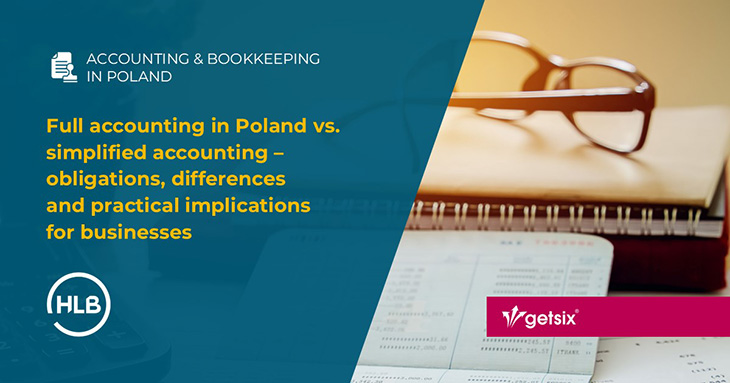Full accounting in Poland vs. simplified accounting – obligations, differences and practical implications for businesses
The rules for maintaining accounting records in Poland are strictly defined by legal regulations, primarily the Polish Accounting Act of 29 September 1994, and the Personal Income Tax Act (PIT Act). Depending on the scale of activity, legal form, and level of revenue, entrepreneurs in Poland may apply simplified accounting or may be legally required to adopt full accounting in Poland. It is important to emphasise clearly: full accounting is not a matter of choice in many cases, but a statutory obligation under Polish law.
In this article:
When is full accounting mandatory in Poland?
According to Article 2 of the Polish Accounting Act, the obligation to maintain full accounting applies to:
- commercial companies (both partnerships and corporations), including limited liability companies, joint-stock companies, limited partnerships, and limited joint-stock partnerships;
- civil law partnerships, registered partnerships, and professional partnerships owned by natural persons, if their net revenue for the previous financial year exceeded the equivalent of EUR 2,000,000;
- natural persons conducting business activity if their revenue also exceeded this threshold;
- representative offices and branches of foreign entrepreneurs;
- foundations, associations, and other organisational units that receive public funding, subsidies, or conduct business activities on specific terms;
- financial sector entities (e.g. banks, investment firms, pension funds), regardless of revenue levels.
In addition, full accounting in Poland may be voluntarily adopted by entities that have not yet exceeded the statutory threshold but wish to increase financial transparency or prepare for a change in legal form.
What characterises full accounting in Poland?
Full accounting is an advanced financial recording system that enables comprehensive management of a company’s assets, liabilities, and financial results. It requires compliance with accounting principles such as:
- the double-entry principle,
- the accrual principle,
- the matching principle.
Under Polish regulations, the entrepreneur (or the accounting office) is obliged to:
- Maintain accounting books – including journals, general ledger, subsidiary ledgers, and trial balances;
- Conduct an annual inventory of assets and liabilities;
- Prepare financial statements – including the balance sheet, profit and loss account, supplementary notes, and cash flow statement;
- Determine the financial result – in accordance with applicable tax and accounting rules;
- Comply with accounting and tax regulations – including updating the accounting policy and chart of accounts.
When is it worthwhile to voluntarily adopt full accounting?
Although full accounting in Poland is mandatory for many businesses, there are also reasons to adopt it voluntarily. The main benefits include:
- better insight into the financial condition of the company,
- easier access to financing (banks and investors expect transparency),
- preparation for transformation into a company (e.g. from sole proprietorship to limited liability company),
- potential for more effective tax optimisation and investment planning.
Consequences of failing to comply with full accounting obligations in Poland
Entrepreneurs who fail to maintain full accounting despite being legally obliged to do so risk:
- the need to retrospectively transform all financial documentation,
- tax corrections and outstanding liabilities,
- potential fiscal penalties or sanctions,
- loss of credibility in dealings with banks and contractors.
Simplified accounting in Poland – scope and limitations
Simplified accounting in Poland is permitted only for entities that did not exceed the revenue limit of EUR 2 million in the previous year and operate as a sole proprietorship or as civil law, registered, or professional partnerships owned by natural persons.
Simplified accounting may take one of three forms:
- Tax Revenue and Expense Ledger (PKPiR) – the most common form among micro-enterprises;
- Lump-sum tax on recorded revenue – does not allow for deducting costs of earning income;
- Tax card – a declining form available only to those continuing activity from before 2022.
Under simplified accounting in Poland, the entrepreneur is not obliged to prepare a balance sheet, maintain analytical accounts, or conduct regular inventory.
Key differences: full accounting vs. simplified accounting in Poland
| Scope | Full accounting in Poland | Simplified accounting in Poland |
|---|---|---|
| Form of record-keeping | Accounting books under the Polish Accounting Act | PKPiR, lump-sum, tax card |
| Legal obligation | Mandatory upon exceeding revenue/legal thresholds | Permitted only in specific, defined cases |
| Financial reporting | Balance sheet, P&L, notes, cash flow statements | No reporting obligation |
| Cost and complexity | High – requires expertise and experience | Lower – can be handled independently |
| Financial control level | High – enables profitability analysis and planning | Limited – harder to assess financial standing |
| Access to financing | Easier due to transparency and reporting | More difficult due to limited documentation |
Full accounting in Poland is not just a legal obligation but also a strategic business management tool. Unlike simplified forms of record-keeping, it enables real control over finances, profitability analysis, risk management, and professional preparation for cooperation with investors and financial institutions.
On the other hand, for small businesses and sole proprietorships, simplified accounting in Poland can offer real convenience – provided that eligibility criteria are met.
Regardless of whether full accounting in Poland is a legal requirement or a strategic business decision for your company – it is essential to ensure compliance with Polish regulations and efficient financial management. getsix® offers comprehensive support in full accounting services in Poland – from day-to-day bookkeeping to the preparation of financial statements. Contact us to learn more.
If you have any questions regarding this topic or if you are in need for any additional information – please do not hesitate to contact us:
CUSTOMER RELATIONSHIPS DEPARTMENT

ELŻBIETA
NARON-GROCHALSKA
Head of Customer Relationships
Department / Senior Manager
getsix® Group
***














